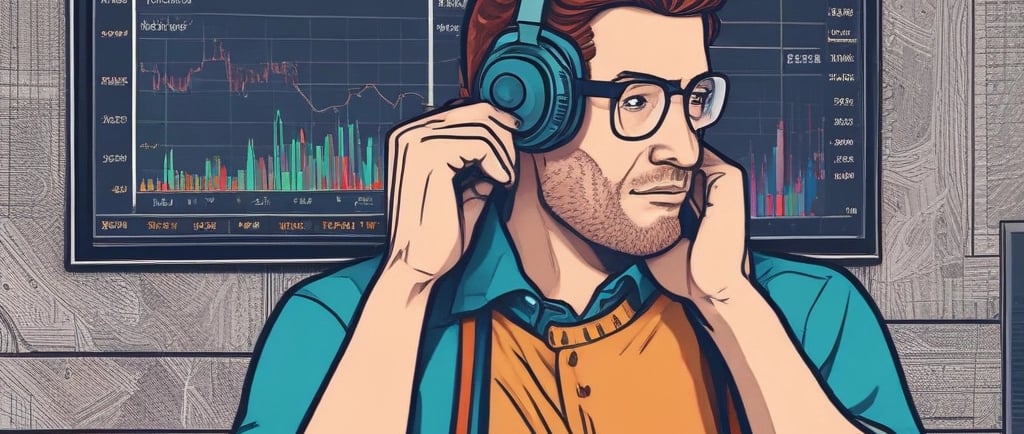How to Overcome Fear of Missing Out (FOMO) in Trading
By Vipul
11/9/20253 min read


Introduction: The Hidden Emotion That Costs You Money
Few emotions are as dangerous to traders as FOMO — the Fear of Missing Out.
It starts small: you see a stock breaking out, the chart looks perfect, and social media is buzzing about it. Your rational brain says, “Wait for your setup,” but your emotional brain screams, “You’ll miss the move!”
So, you jump in. The market reverses. You exit in panic.
Sound familiar? Every trader experiences it — but few learn to master it.
FOMO isn’t a sign of weakness; it’s a psychological response hardwired into human behavior. The key is understanding how it works — and training your mind to stay calm when the market moves without you.
1. What FOMO Really Is (And Why It Feels So Strong)
FOMO is your brain’s reaction to uncertainty and social comparison.
When you see others profiting, your brain triggers the same stress response it would if you were being left behind by your tribe. It’s a survival instinct, not a trading skill.
In trading, this causes impulsive entries, oversized positions, and emotional decision-making.
The irony? By chasing what you fear missing, you almost always create the loss you wanted to avoid.
2. Recognize the Triggers
FOMO doesn’t appear out of nowhere — it’s triggered by patterns.
Here’s what usually sets it off:
Seeing a fast-moving candle or breakout.
Watching others post wins online.
Missing one “big trade” and feeling behind.
Sitting in cash while the market rallies.
Knowing your triggers gives you power. Once you recognize what sparks your FOMO, you can pause before acting on it.
3. The “If I Miss It, So What?” Mindset
You don’t need to catch every move — you only need to catch your moves.
Every professional trader knows this: the market will be here tomorrow. Missing one trade means nothing if you stay consistent.
Adopt this mantra:
“If I miss a move that’s not in my plan, I’ve actually won — because I stayed disciplined.”
FOMO loses its control when you realize missing an emotional trade is a form of victory.
4. Build Confidence Through a Clear Plan
FOMO thrives in uncertainty. Without a structured trading plan, every setup looks like a potential “big one.”
You can crush that uncertainty by defining:
Your entry rules (price, pattern, confirmation).
Your exit rules (targets, stops).
Your position size (risk per trade).
Once your plan is in place, you’ll trust your process — not your emotions. Confidence kills FOMO faster than any quote or motivational speech ever could.
5. Limit Information Overload
Constantly checking social media, alerts, and news feeds feeds your anxiety.
The more opinions you consume, the harder it becomes to trust your own.
To manage this:
Mute trading groups during active market hours.
Follow fewer traders — only those who educate, not hype.
Check markets at fixed times instead of refreshing constantly.
The goal is to reduce external noise so your decisions come from analysis, not adrenaline.
6. Use the “Next Trade” Rule
When you feel FOMO rising, say this:
“If I miss this one, I’ll catch the next one.”
There will always be another setup. Always.
Reminding yourself of that simple truth brings instant calm and helps you regain control before making an emotional decision.
7. Practice Emotional Distance
You can’t trade well if every candle feels personal.
Try these techniques to detach emotionally:
Meditate or breathe deeply before trading sessions.
Keep a journal of FOMO-triggered trades and how they ended.
Simulate missed trades — track what would have happened if you didn’t enter. Often, you’ll see that most “missed” trades would have failed anyway.
Over time, you’ll realize missing out isn’t painful — it’s protective.
Conclusion: Letting Go of the Need to Catch Everything
FOMO fades the moment you stop chasing every opportunity and start focusing on your opportunities.
When you build discipline, patience, and trust in your plan, the urge to “jump in before it’s too late” disappears.
The market always gives second chances — but it rarely forgives emotional ones.
Key Takeaway:
FOMO isn’t about missing profits — it’s about losing control.
Real traders know opportunities are infinite, but capital and discipline are not.
© 2025. All rights reserved.
Reader Awareness Disclaimer
The information provided on "this website" is for educational and informational purposes only and should not be considered financial, investment, or trading advice. While we strive to ensure the accuracy and reliability of our content, "this website" makes no guarantees or warranties about the completeness, accuracy, or timeliness of the information presented.
All articles, analyses, and opinions expressed on this website are based on independent research or public data and reflect the views of the respective authors. Readers are strongly advised to conduct their own research or consult with a qualified financial advisor before making any investment decisions.
"This Website" will not be liable for any financial loss, damages, or consequences resulting from the use or reliance on information published on this site. Market conditions and investment outcomes can change rapidly; readers should always proceed with caution.